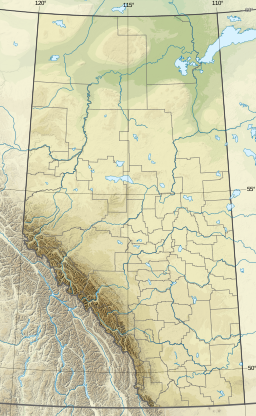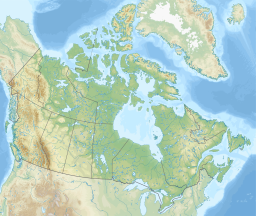Cold Lake[2] is a large lake in Northern Alberta and Saskatchewan, Canada. The lake straddles the Alberta / Saskatchewan border, and has a water area of 373 km2 (144 sq mi). It is also one of the deepest lakes in Alberta with a maximum depth of 200.1 m (656 ft). It has around 24 known species of fish and is a major ice fishing lake. Cold Lake is also major stop for many migrating birds, and is home to one of the largest warbler populations in Alberta.[1] A surface of 248 km2 (96 sq mi) lies in the province of Alberta.
| Cold Lake | |
|---|---|
 Kinosoo Beach on the edge of Cold Lake. | |
| Location | Bonnyville No. 87, Alberta / Beaver River No. 622, Saskatchewan |
| Coordinates | 54°33′N 110°03′W / 54.550°N 110.050°W |
| Type | Mesotrophic |
| Part of | Churchill River drainage basin |
| Primary inflows | |
| Primary outflows | Cold River |
| Catchment area | 6,140 km2 (2,370 sq mi)[1] |
| Basin countries | Canada |
| Surface area | 373 km2 (144 sq mi)[1] |
| Average depth | 49.9 m (164 ft)[1] |
| Max. depth | 200.1 m (656 ft)[1] |
| Surface elevation | 535 m (1,755 ft)[1] |
| Islands | Murray Island |
| Settlements | City of Cold Lake |


The city of Cold Lake is located on the shore. Excepting the western shore, the lake is surrounded by protected areas such as the Cold Lake Provincial Park in Alberta and the Meadow Lake Provincial Park in Saskatchewan. The Cold Lake 149 A and B Indian reserves of the Cold Lake First Nations are established on the western and southern shores respectively. Cold Lake House was a trading post built by the Montreal traders in 1781 near present-day Beaver Crossing, Alberta, south of Cold Lake.
The Martineau River flows from Primrose Lake into Cold Lake, which in turn discharges through the Cold River. The Cold River travels through a series of lakes in Meadow Lake Provincial Park[3] and ends as it empties into Lac des Îles. The Waterhen River, which is a major tributary of Beaver River, is the primary outflow for Lac des Îles and it continues east where it meets Beaver River, a major tributary of the Churchill River.
The lake has a native legend of a large lake monster, the "kinosoo", with many residents claiming to have evidence or have seen it. Although some sources claim it has 91 m (299 ft) max depth, sonar scans of certain areas of the lake have yielded depths of over 200 m (660 ft), and evidence of glacial ice under the lake, would yield an even greater depth if one wanted to count it as water depth as well.[citation needed]
Fish species
editFish species include walleye, sauger, yellow perch, northern pike, lake trout, lake whitefish, cisco, burbot, white sucker, and longnose sucker. Both Alberta and Saskatchewan angling licences are valid on the entire lake.[4][5][6]
Fossil record
editCold Lake preserves an extensive fossil and subfossil record from the latest part of the Late Pleistocene, after the Last Glacial Maximum, to the Late Holocene. By the Middle Holocene, the mammalian fauna that lived in the region was in essence a modern one.[7]
See also
editReferences
edit- ^ a b c d e f Atlas of Alberta Lakes. "Cold Lake". Archived from the original on 28 September 2011. Retrieved 3 January 2008.
- ^ Government of Canada, Natural Resources Canada. "Place names - Cold Lake". www4.rncan.gc.ca.
- ^ "Meadow Lake Provincial Park | Tourism Saskatchewan".
- ^ "Fishing in Cold Lake".
- ^ "Angler's Atlas".
- ^ "Fishing and Hunting". 10 December 2021.
- ^ Jass, Christopher N.; Caldwell, Devyn; Barrón-Ortiz, Christina I.; Beaudoin, Alwynne B.; Brink, Jack; Sawchuk, Matthew (29 November 2017). "Underwater faunal assemblages: radiocarbon dates and late Quaternary vertebrates from Cold Lake, Alberta and Saskatchewan, Canada". Canadian Journal of Earth Sciences. 55 (3): 283–294. doi:10.1139/cjes-2017-0131. hdl:1807/82470. ISSN 0008-4077. Retrieved 2 September 2024 – via Canadian Science Publishing.
External links
editMedia related to Cold Lake (Alberta) at Wikimedia Commons

